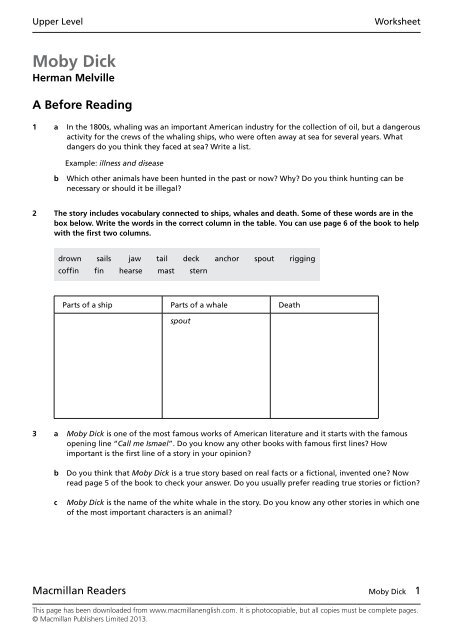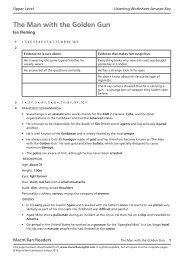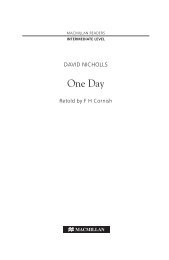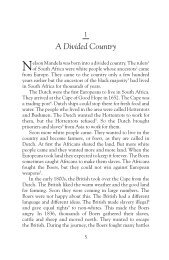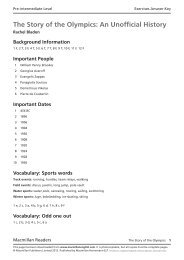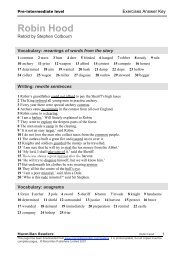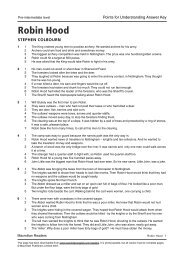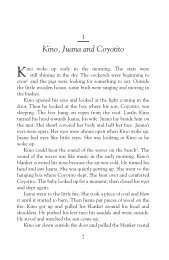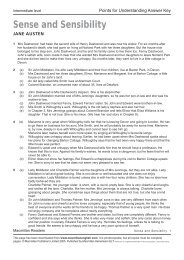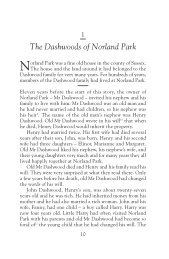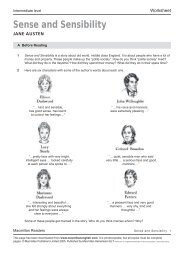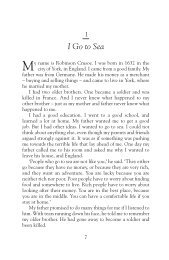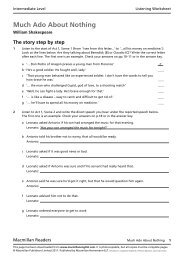Moby Dick - Macmillan Readers
Moby Dick - Macmillan Readers
Moby Dick - Macmillan Readers
Create successful ePaper yourself
Turn your PDF publications into a flip-book with our unique Google optimized e-Paper software.
Upper Level<br />
Worksheet<br />
<strong>Moby</strong> <strong>Dick</strong><br />
Herman Melville<br />
A Before Reading<br />
1 a In the 1800s, whaling was an important American industry for the collection of oil, but a dangerous<br />
activity for the crews of the whaling ships, who were often away at sea for several years. What<br />
dangers do you think they faced at sea? Write a list.<br />
Example: illness and disease<br />
b<br />
Which other animals have been hunted in the past or now? Why? Do you think hunting can be<br />
necessary or should it be illegal?<br />
2 The story includes vocabulary connected to ships, whales and death. Some of these words are in the<br />
box below. Write the words in the correct column in the table. You can use page 6 of the book to help<br />
with the first two columns.<br />
drown sails jaw tail deck anchor spout rigging<br />
coffin fin hearse mast stern<br />
Parts of a ship Parts of a whale Death<br />
spout<br />
3 a <strong>Moby</strong> <strong>Dick</strong> is one of the most famous works of American literature and it starts with the famous<br />
opening line “Call me Ismael”. Do you know any other books with famous first lines? How<br />
important is the first line of a story in your opinion?<br />
b<br />
c<br />
Do you think that <strong>Moby</strong> <strong>Dick</strong> is a true story based on real facts or a fictional, invented one? Now<br />
read page 5 of the book to check your answer. Do you usually prefer reading true stories or fiction?<br />
<strong>Moby</strong> <strong>Dick</strong> is the name of the white whale in the story. Do you know any other stories in which one<br />
of the most important characters is an animal?<br />
<strong>Macmillan</strong> <strong>Readers</strong> <strong>Moby</strong> <strong>Dick</strong> <br />
This page has been downloaded from www.macmillanenglish.com. It It is is photocopiable, but all all copies must be be complete pages.<br />
2008. Published by <strong>Macmillan</strong> Heinemann ELT. Heinemann is a registered trademark of Harcourt Education, used under licence.<br />
© <strong>Macmillan</strong> Publishers Limited 2013.
Upper Level<br />
Worksheet<br />
B While reading<br />
4 During the voyage, the Pequod meets many other ships. As you read, keep a record of the ships she<br />
meets, where they come from and what news they give of <strong>Moby</strong> <strong>Dick</strong>.<br />
Name of ship Country of origin News of <strong>Moby</strong> <strong>Dick</strong><br />
The Albatross England<br />
No news, as it was too windy to hear the captain’s<br />
words.<br />
5 a The characters in the story give a lot of importance to signs which they believe show good or bad<br />
luck. As you read, make a list of these signs.<br />
Signs of good luck<br />
Ismael choosing the ship he would sail on with<br />
Queequeg<br />
Signs of bad luck<br />
Elijah’s warning<br />
b<br />
Are you a superstitious person? If so, which objects, signs and actions do you believe can bring<br />
good or bad luck? Do you think that people now are more or less superstitious than they were in<br />
the 1800s?<br />
<strong>Macmillan</strong> <strong>Readers</strong> <strong>Moby</strong> <strong>Dick</strong> <br />
This page has been downloaded from www.macmillanenglish.com. It It is is photocopiable, but all all copies must be be complete pages.<br />
2008. Published by <strong>Macmillan</strong> Heinemann ELT. Heinemann is a registered trademark of Harcourt Education, used under licence.<br />
© <strong>Macmillan</strong> Publishers Limited 2013.
Upper Level<br />
Worksheet<br />
C After Reading<br />
6 a Queequeg describes his motivations for travelling as a sailor:<br />
“I wanted to learn about different lands and different people. Then I planned to go back to my<br />
island and teach these things to my own people. I believed I would learn things to make my people<br />
even happier and cleverer. But I soon discovered that people everywhere can be both miserable and<br />
bad.” (page 14)<br />
Do you think that travelling helps you learn new things and makes you happier and cleverer? Or<br />
can we learn as much by staying at home? Write your ideas of the advantages and disadvantages of<br />
travelling in the table.<br />
Advantages<br />
You can learn new things and become<br />
more open-minded<br />
Disadvantages<br />
It’s time-consuming and sometimes<br />
uncomfortable<br />
7 “<strong>Moby</strong> <strong>Dick</strong>… is also known as the story about an individual’s struggle against fate or against nature,<br />
and about the battle between good and evil, the great white whale symbolising evil. However, Ahab’s<br />
determination to destroy the whale can be seen as evil and wicked too.” (page 5)<br />
a In your opinion, does good or evil win in the end? Is Ahab crazy to be angry with an animal, as<br />
Starbuck suggests (page 25), or is it normal for him to want revenge for his lost leg? Could the crew<br />
have stopped him trying for revenge?<br />
b<br />
Like Queequeg, do you believe that we can choose whether or not to live or die (page 59)? Or, as<br />
Fedallah accepted his death, do we have to accept fate?<br />
8 a Were you surprised by the end of the story? Did you guess that Ismael was the ‘third man’? Is it a<br />
believable ending that he managed to survive?<br />
b<br />
Write a different ending for the story in which Ahab is successful in killing <strong>Moby</strong> <strong>Dick</strong> on his third<br />
attempt. Include details of:<br />
- how Ahab killed the whale<br />
- how Ahab and the crew reacted to the killing and what they did afterwards<br />
9 Write a character study of one of the characters from the story. Include details of:<br />
– their physical appearance<br />
– their personality and what they believe and want<br />
– their role on the ship and in the whale hunting<br />
– their death (if they died)<br />
<strong>Macmillan</strong> <strong>Readers</strong> <strong>Moby</strong> <strong>Dick</strong> <br />
This page has been downloaded from www.macmillanenglish.com. It It is is photocopiable, but all all copies must be be complete pages.<br />
2008. Published by <strong>Macmillan</strong> Heinemann ELT. Heinemann is a registered trademark of Harcourt Education, used under licence.<br />
© <strong>Macmillan</strong> Publishers Limited 2013.


